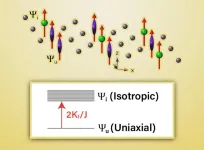(Press-News.org) Research led by the Milner Centre for Evolution at the University of Bath looking at the evolution of terrestrial orchid species has found that global cooling of the climate appears to be the major driving factor in their diversity. The results help scientists understand the role of global climate on diversity of species, and how our current changing global climate might affect biodiversity in the future.
One of the largest families of plants, there are around 28,000 species of orchids growing across the world. These plants are known for their huge variety of different sized and shaped flowers, so why are there so many species
Climate change driving speciation
Charles Darwin studied orchids as a model for evolution through natural selection, proposing that they evolved an array of different flowers gradually over time to attract specific pollinators.
However, scientists at the Universities of Bath and York studying almost 1500 species of terrestrial orchids, have found that rather than evolving gradually over thousands of years, these plants diversified relatively quickly due to changes in global temperature.
Analysing thousands of DNA sequences, they compiled a family tree showing relationships between the species, and used statistical models to test how changes in climate during the Earth’s history might have driven the formation of new species. They then tested the different possible models using more than 2.5 million records of geographical distributions.
They found evidence that most of the species appeared during the last 10 million years, coinciding with global cooling, as calculated from geological records.
Modelling the probability of different drivers of speciation suggested that global cooling is 700 times more likely to influence speciation of orchids than time alone.
Everything, everywhere, all at once
Dr Jamie Thompson, first author of the paper and researcher at the Milner Centre for Evolution at the University of Bath, said: “Darwin proposed that orchids adapted gradually through natural selection to attract different pollinators, but our data show that it’s more complicated than that.
“There was an explosion of diversity in terrestrial orchids across the globe within the last 10 million years, with all the major lineages of these plants emerging at roughly the same time.
“We found this correlated with global climate change, so that more species emerged as the climate cooled, giving the first evidence of global cooling driving speciation in these plants.”
Speciation rate independent of diversity
The researchers also found that the speciation rate – how quickly new species arise – wasn’t dependent on how many species there were to begin with.
Dr Nick Priest, Lecturer at the Milner Centre for Evolution and senior author of the study, said: “Our biogeographic analysis revealed consistent effects of climate change on speciation across the Earth. But we were surprised to find that the regions that have high diversity don’t necessarily have high speciation rates.
“This has implications for conservation strategies – that we can’t just count on preserving a few small pockets of land to protect evolutionary diversity – it’s important to try and conserve everything we possibly can.
“What we want to investigate next in all flowering plants is whether there is a simple effect of temperature or if there is a threshold that needs to be passed before there is a surge in speciation.
“We also want to predict how rising temperatures due to global climate change will impact the processes generating plant biodiversity.”
Dr Katie Davis, Lecturer in Palaeobiology at the University of York, said: "Our findings also show the importance of considering evolution over geological time scales. Understanding how organisms evolve in response to global environmental change has important implications for conservation and we can only know this by looking at the deep evolutionary history."
The findings are published in the prestigious journal Proceedings of the National Academy of Science USA (PNAS).
END
Global cooling caused diversity of species in orchids, confirms study
2023-07-10
ELSE PRESS RELEASES FROM THIS DATE:
Real-world context increases capacity for remembering colors
2023-07-10
Human memory is fundamental to everything we do. From remembering the faces of someone you just met to finding your cell phone that you just left on a table, one's "visual working memory"— the core cognitive system that retains visual information in an active state for a short period of time, plays a vital role. Prior work has found that visual working memory capacity is well correlated with other important cognitive abilities such as academic performance, and fluid intelligence, which includes general reasoning and problem solving, so understanding its limits is integral to understanding how human cognition works.
In the past, theories have proposed that an individual’s ...
Argonne scientist Shirley Meng recognized for contributions to battery science
2023-07-10
The Electrochemical Society (ECS) has selected scientist Shirley Meng of the U.S. Department of Energy’s (DOE) Argonne National Laboratory as the recipient of the 2023 Battery Division Research Award for innovative research on interfacial science, which has led to improved battery technologies.
A pioneer in discovering and designing better materials for energy storage, Meng serves as chief scientist of the Argonne Collaborative Center for Energy Storage Science (ACCESS) and as a professor at the Pritzker School of Molecular ...
Researchers make a surprising discovery about the magnetic interactions in a Kagome layered topological magnet
2023-07-10
A team from Ames National Laboratory conducted an in-depth investigation of the magnetism of TbMn6Sn6, a Kagome layered topological magnet. They were surprised to find that the magnetic spin reorientation in TbMn6Sn6 occurs by generating increasing numbers of magnetically isotropic ions as the temperature increases.
Rob McQueeney, a scientist at Ames Lab and project lead, explained that TbMn6Sn6has two different magnetic ions in the material, terbium and manganese. The direction of the manganese moments controls the topological state, “But ...
Deciphering progesterone’s mechanisms of action in breast cancer
2023-07-10
“The mechanisms underlying the observed effects of progesterone on breast cancer outcomes are unclear.”
BUFFALO, NY- July 10, 2023 – A new research perspective was published in Oncotarget's Volume 14 on July 1, 2023, entitled, “Deciphering the mechanisms of action of progesterone in breast cancer.”
A practice-changing, randomized, controlled clinical study established that preoperative hydroxyprogesterone administration improves disease-free and overall survival in patients with node-positive breast cancer. In this new perspective, researchers Gaurav Chakravorty, Suhail Ahmad, Mukul S. Godbole, Sudeep Gupta, Rajendra A. Badwe, ...
More data needed on lifestyle interventions for postpartum blood pressure control
2023-07-10
Hypertensive disorders of pregnancy such as preeclampsia and gestational hypertension occur in up to 10% of pregnancies and are associated with a three-fold increased risk of chronic hypertension and up to two-fold increased risk of cardiovascular disease when compared with healthy pregnancies. While the year after pregnancy is a critical time to address hypertension risk with lifestyle changes (healthy diet and exercise), the effects of lifestyle interventions on postpartum blood pressures are not well documented.
A new Boston University Chobanian & Avedisian School of Medicine study has found that there are few relevant studies on the ...
New biodegradable plastics are compostable in your backyard
2023-07-10
We use plastics in almost every aspect of our lives. These materials are cheap to make and incredibly stable. The problem comes when we're done using something plastic — it can persist in the environment for years. Over time, plastic will break down into smaller fragments, called microplastics, that can pose significant environmental and health concerns.
The best-case solution would be to use bio-based plastics that biodegrade instead, but many of those bioplastics are not designed to degrade in backyard composting conditions. They must be processed in commercial composting facilities, which are not accessible in all regions of the ...
Canned, frozen corn industry struggling across US growing regions
2023-07-10
URBANA, Ill. — For those whose primary experience with corn is the butter-drenched cob variety, it might come as a surprise that other forms of sweet corn are in trouble. A new University of Illinois Urbana-Champaign analysis shows sweet corn production for frozen and canned products has been steadily shrinking in the U.S. over the past 27 years, particularly in rainfed portions of the Midwest.
“The processing sweet corn industry [corn grown for canned and frozen products] was thriving in the U.S. throughout the 20th century. This type of production, ...
Ethics & Human Research, July-August 2023
2023-07-10
Antiracist Structural Intervention at the Emory University Institutional Review Board
Francois Rollin, Vanessa Van Doren, Jessica Alvarez, Rebecca Rousselle, Jada Bussey-Jones
Although racial and ethnic categories are social constructs without inherent biologic or genetic meaning, race and ethnicity impact health outcomes through racism. The use of racial categories in biomedical research often misattributes the cause of health inequities to genetic and inherent biological differences rather than to racism. Improving research ...
Unhealthy beverage consumption highest among economically-vulnerable households that rely on multiple food assistance programs
2023-07-10
Philadelphia, July 10, 2023 – A long-standing and contentiously debated question is the extent to which US federal food assistance programs contribute to or deter healthy beverage intake. Findings of a new study in the Journal of Nutrition Education and Behavior, published by Elsevier, show that while beverage intake patterns rarely differed between mothers and young children who participated only in the Supplementation Nutrition Program for Women, Infants, and Children (WIC), only the Supplemental ...
Tumor monocyte content predicts immunochemotherapy outcomes for esophageal cancer
2023-07-10
JULY 10, 2023, NEW YORK – A Ludwig Cancer Research study has discovered that the presence of relatively high numbers of immune cells known as monocytes in tumors is linked to better outcomes in esophageal cancer patients treated with a combination of chemotherapy and immunotherapy, or immunochemotherapy. Esophageal cancer is the sixth leading cause of cancer mortality worldwide, and the incidence of esophageal adenocarcinoma has been climbing at a relatively swift clip over the past 40 years. Survival times for inoperable or metastatic forms of the cancer range from 6 to 12 months.
Led by Ludwig Oxford Director Xin Lu and ...






